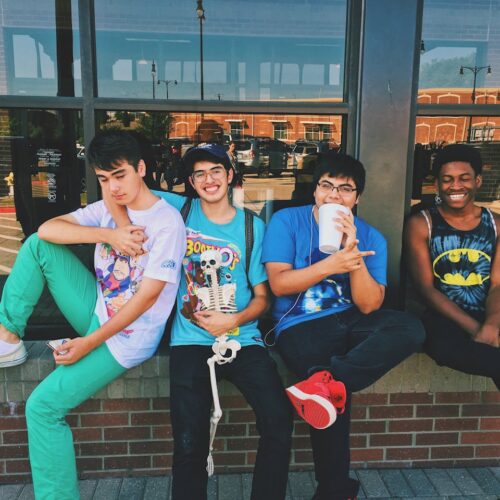Spotlight on Young Adults in the Justice System: Emerging Approaches to a Population in Flux
In 2012, young adults—people between the ages of 18 and 24—accounted for just 10 percent of the U.S. population but nearly 30 percent of people arrested and 21 percent of all people admitted to adult state and federal prisons. In that same year, 18- to 20-year-olds accounted for approximately 20 percent of people in juvenile residential facilities; of those, 40 percent were black, according to data from the U.S. Department of Justice’s Office of Juvenile Justice and Delinquency Prevention.
Developmental research shows that young adults continue to mature well into their 20s and exhibit clear differences from both youth and older adults. Although young adults are more cognitively developed than youth, they are also more impulsive, more likely to engage in risky behaviors, and less cognizant of the consequences of their actions than older adults. Many young adults lack engagement in school and work, face mental health and substance use issues, are disconnected from family and other caring adults, and experience homelessness—all factors that put them at risk of entering the justice system. Data also show that young adults have higher recidivism rates than older adults.
Tailored Approaches
In response to criminal justice data trends and developmental research, states are exploring various approaches to better support young adults in the justice system:
- Raising the age is a policy that involves setting a higher maximum age for juvenile court jurisdiction so that young adults—those as old as 21 in some states—who commit certain offenses can be adjudicated in the juvenile justice system rather than the adult criminal justice system.
- Youthful offender status policies allow the cases of young adults to be considered in juvenile or family court instead of adult criminal court, typically by recommendation of the court or prosecutor, depending on the state.
- Separate facilities and caseloads are used in some jurisdictions to ensure that young adults receive specialized attention and supervision.
- Targeted programming seeks to meet the distinct needs of young adults in areas like employment, mental health, substance use, education, and family engagement.
As of 2015, the upper age of juvenile court jurisdiction was 18 in 41 states, but the number of states raising the age continues to grow. In 2016, Louisiana and South Carolina passed legislation to raise the age from 17 to 18, and some states considered raising the age for juvenile court jurisdiction even further to age 21. Although those bills ultimately did not pass, the efforts signal momentum for identifying ways to deal with young adults more effectively.
And while few specialized interventions exist and have been proven to reduce recidivism and improve other outcomes for young adults, some service providers are testing targeted services to meet the needs of this group.
One Program’s “Mad Love” for Young Adults
When Jamel Bonilla left prison at age 21 after serving almost two years for a felony, his employment options were limited.
Now age 23, Bonilla works four days a week in a café at UTEC, a youth development, employment, and education nonprofit that serves youth between the ages of 17 and 25 in Lowell and Lawrence, Massachusetts. At Café UTEC, which is open to the public, Bonilla readies kitchen equipment, prepares food, and serves customers, working alongside other young adults with similar experiences.
Recently highlighted in a National Institute of Justice report as providing a promising, innovative approach to young adults in the criminal justice system, UTEC received a Second Chance Act (SCA) mentoring grant in 2014 and an SCA Supporting Latino/a Youth from Out-of-Home Placement to the Community grant in 2015. UTEC’s program model specifically targets “impact youth”—those who have had serious criminal and gang involvement.
“We want to transfer that [negative impact] into a positive impact,” said UTEC Director of Evaluation Erin Harris. “We’re serving youth who other people have given up on.”
Through inreach to correctional facilities, UTEC’s Streetworkers build relationships with youth and lay the foundation for further engagement with the program. Streetworkers continue to provide support to youth after they are released from incarceration—starting with picking them up at the facility the day they are released. Youth who choose to move forward with the program are matched with a transitional coach, who works with each youth on addressing his or her specific needs and any barriers to engagement with the program, such as substance use or mental health issues.
“When I came [to UTEC] I was quiet, I didn’t really talk much,” Bonilla said. “Honestly, I was afraid of what people would think or what people would say to me. And then once you get to know people here—not only the youth, even the staff—it just helps you open up more.”
UTEC’s program model involves connecting youth to paid on-site work opportunities in mattress recycling, food services enterprises like Café UTEC, and woodworking. Every Friday, participants attend workshops on different topics like social justice and civic engagement. Underlying all of these activities is UTEC’s core value of showing “madd love” to each and every participant, regardless of the circumstances.
“One of the themes that comes back pretty consistently from youth about what they like about UTEC is that it feels like a family,” Harris said. “And for many of these youth who don’t have stable families, that’s really important.”
A key to working with this population, according to Harris, is patience and understanding that youth will engage and disengage from the program multiple times. Harris also sees UTEC’s use of data on participant engagement and outcomes as a crucial aspect of program delivery.
“We’re using data not just for funders and for outcome reports, but also for our own learning and continuous improvement,” Harris said. “We’re constantly learning and tweaking things, and not getting discouraged by that.”
Bonilla has been a UTEC participant for nearly 18 months and says that UTEC was instrumental in his transition from incarceration back into the community. In addition to his work at the café, he has become involved in an expungement campaign through UTEC, advocating for a policy that would offer the expungement of juvenile records for eligible youth in Massachusetts.
“[UTEC] is a place … not only for a second chance, but for a twelfth, thirteenth, fourteenth chance,” Bonilla said.
– – –
Read Reducing Recidivism and Improving Other Outcomes for Young Adults in the Juvenile and Adult Criminal Justice Systems for more information about supporting young adults in the justice system.
In response to growing calls for police reform in New Jersey, particularly following the shootings of Najee Seabrooks…
Read More Three Things to Know About New Jersey’s Groundbreaking Community Response Legislation
Three Things to Know About New Jersey’s Groundbreaking Community Response Legislation
In response to growing calls for police reform in New Jersey, particularly…
Read More Apply Now: Join a Learning Community for Community and Crisis Response Teams to Improve Responses to Youth
Read More
Apply Now: Join a Learning Community for Community and Crisis Response Teams to Improve Responses to Youth
Read More
 Apply Now: Join a Learning Community Focused on Substance Use and Overdose Community Response Programs
Read More
Apply Now: Join a Learning Community Focused on Substance Use and Overdose Community Response Programs
Read More













